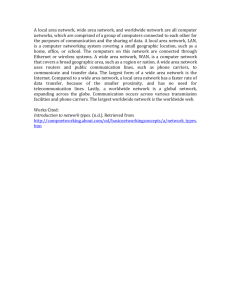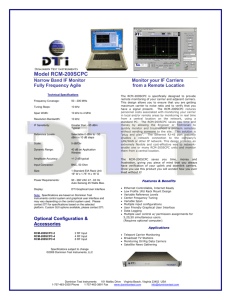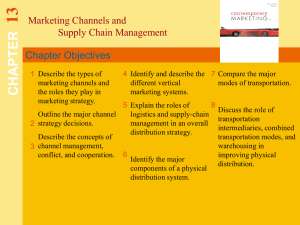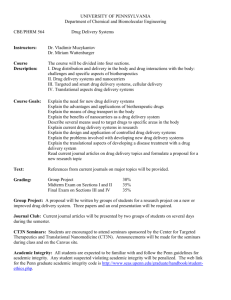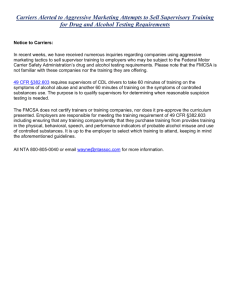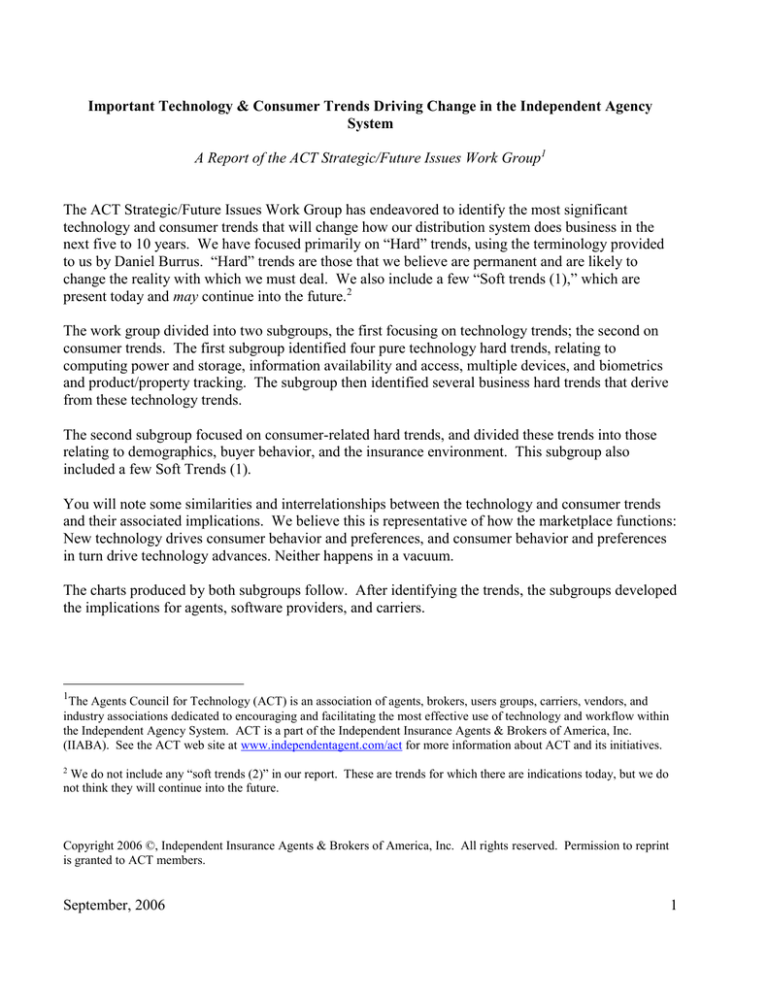
Important Technology & Consumer Trends Driving Change in the Independent Agency
System
A Report of the ACT Strategic/Future Issues Work Group1
The ACT Strategic/Future Issues Work Group has endeavored to identify the most significant
technology and consumer trends that will change how our distribution system does business in the
next five to 10 years. We have focused primarily on “Hard” trends, using the terminology provided
to us by Daniel Burrus. “Hard” trends are those that we believe are permanent and are likely to
change the reality with which we must deal. We also include a few “Soft trends (1),” which are
present today and may continue into the future.2
The work group divided into two subgroups, the first focusing on technology trends; the second on
consumer trends. The first subgroup identified four pure technology hard trends, relating to
computing power and storage, information availability and access, multiple devices, and biometrics
and product/property tracking. The subgroup then identified several business hard trends that derive
from these technology trends.
The second subgroup focused on consumer-related hard trends, and divided these trends into those
relating to demographics, buyer behavior, and the insurance environment. This subgroup also
included a few Soft Trends (1).
You will note some similarities and interrelationships between the technology and consumer trends
and their associated implications. We believe this is representative of how the marketplace functions:
New technology drives consumer behavior and preferences, and consumer behavior and preferences
in turn drive technology advances. Neither happens in a vacuum.
The charts produced by both subgroups follow. After identifying the trends, the subgroups developed
the implications for agents, software providers, and carriers.
1
The Agents Council for Technology (ACT) is an association of agents, brokers, users groups, carriers, vendors, and
industry associations dedicated to encouraging and facilitating the most effective use of technology and workflow within
the Independent Agency System. ACT is a part of the Independent Insurance Agents & Brokers of America, Inc.
(IIABA). See the ACT web site at www.independentagent.com/act for more information about ACT and its initiatives.
We do not include any “soft trends (2)” in our report. These are trends for which there are indications today, but we do
not think they will continue into the future.
2
Copyright 2006 ©, Independent Insurance Agents & Brokers of America, Inc. All rights reserved. Permission to reprint
is granted to ACT members.
September, 2006
1
Technology & Related Business Hard Trends
Hard Trend:
Technology
COMPUTING POWER
AND STORAGE
Enhancements in
technology will continue
to provide significant
increases in computing
power and storage
capability.
Business Trend
September, 2006
Virtually all
communication, data
exchange and inquiry
will be in “real time”.
The ease of entry will
encourage new
competition from both
traditional and nontraditional sources.
Increasingly, the
buying process
(research – sale) will
start and often finish
on the Internet.
Sales and servicing
will be processed 24/7
via the device of the
users choice:
desktop, laptop, TV,
cell phone, iPOD,
PDA, etc.
Customers
expectations will be
for full service from
anywhere at any time
from any device they
have in hand,
seamlessly, with and
without the
involvement of a
human being.
Customers will expect
to access account
information from all
service providers on-
Implications for Agents
New competition from
groups like warehouse
stores and affinity
organizations will challenge
you for the same
customers.
Is the one workflow for
multiple devices?
Multiple portable devices
will need to integrate with
the agency management
system and comparative
raters.
Agents need to learn how to
take advantage of the
power of the individual
communications devices.
E.g., do a quote on an
iPOD, teleconference with a
customer via TV, etc.
Security will become a more
complex issue:
o Secure email needs
to fit agency
workflow
o Portable device
need to be secured
as storage devices,
as transmission
devices and from
viruses of all types.
Support for transactions
and service will need to be
available 24x7.
Agents will have to build
Implications for Software
Providers
New vendors will have the
advantage of no legacy
system(s) to impede
development with new high
technology solutions.
Investments in some new
technologies may require
significant “marketing” to
promote their value and
usage.
Vendors will need to enable
the access to information on
an anytime anywhere on any
device as needed basis.
o The responsibility for
providing technology
tools to help
agencies with
regulatory
compliance will be
that of the vendors.
(HIPAA, SOX, etc.)
o Security and Privacy
tools such as
biometrics will need
to be incorporated
into systems.
Agents will have need for
website support, including the
ability to provide customers
with real-time responses
using video, voice, and text
messaging.
Implications for Carriers
New competition from
groups like warehouse
stores and affinity
organizations will challenge
you and your agents for the
same customers.
Investments in some new
technologies may require
significant “marketing” to
promote their value.
How are you going to
secure data in transit from
agents and customers?
How are you going to
integrate portable devices
into your legacy systems?
There will be demand from
consumers and agents for
communications via multiple
media and devices.
Security will become a more
complex issue:
o Carrier and agency
generated secure
email needs to fit
agency workflow
o What controls
should be placed
on outgoing secure
email? Can it be
copied? Can it be
forwarded?
o Portable devices
need to be secured
as storage devices,
2
Hard Trend:
Technology
Business Trend
INFORMATION
AVAILABILITY &
ACCESS
Ubiquitous
availability of and
access to information,
regardless of location,
through superior
availability of
broadband and
wireless connectivity.
September, 2006
line and will become
comfortable with
performing
increasingly complex
tasks in a self-service
mode.
The next generation
of websites will marry
voice, video, and
graphics.
Geographic
boundaries will lose
relevance and in a
practical sense
disappear.
Telecommuting for
work will become
more prevalent. (This
will be encouraged as
a result of
environmental and
conservation issues.)
We will see the
introduction of
“Intelligent Agents” –
Complete customer
information that will be
used by consumers to
search the web for
relevant products and
services.
The ubiquity of
“search” will change
the way we
Advertise/Market our
products and services.
Implications for Agents
Implications for Software
Providers
their brand on the Internet
as consumers increasingly
go to the Internet first for
their information and
service.
Agents will need to be able
to provide customers with
real-time service on the
Internet, as their
competitors will do.
Need to accommodate the
reach to variety of multicultural and ethnic groups.
o How will you deal
with multi-language
self-servicing on
your web site?
Telecommuting for work will
become more prevalent.
Agency web portals will
provide an invisible pass
through access for the
customer to the carrier
sites.
We will be able to find more
about people and
organizations from data
stored in “cyberspace” and
on third party data bases.
What do you use? How do
you use it?
Agents will be able to track
individuals’ behavior on
their websites. How can
agents use this tool to
provide customized
Implications for Carriers
In that agents need to reach
to a variety of multi-cultural
and ethnic groups, there is
an increased need for
multiple languages and
varying data formats (names
in particular).
o Multiple languages
will be needed for
self-servicing from
the management
system.
Powerful search engines will
be built into the agency
management systems. How
will they be used? What are
the moral implications?
Real Time processing and
information exchange will
grow to include customers
and other “stakeholders” in
insurance transactions.
Agency management
systems will need to
aggregate information from
multiple sources.
as transmission
devices and from
viruses of all types.
Support for transactions
and service will need to be
available 24x7.
Agents will need to provide
carrier supplied information
to their customers in realtime through their agency
websites.
In that agents need to
accommodate the reach to
a variety of multi-cultural
and ethnic groups, there is
an increased need for
multiple languages and
varying data formats
(names in particular).
Carrier sites will need to
address multi-language
capability, beyond the
Hispanic market.
Telecommuting for work will
become more prevalent.
How will you take
advantage of power of
VOIP, instant messaging,
streaming video, TV, car
screens, etc?
Responses will be required
without the involvement of a
person – or if with a person,
on the device in hand.
We will be able to find more
about more people and
organizations from data
3
Hard Trend:
Technology
Business Trend
The ability to use
VoIP as a business
telecom network will
support
telecommuting.
Implications for Agents
September, 2006
services?
With a phone number, one
can pull name & address,
vehicles in household,
employer, family members,
current policy, MVR, loss
history, and what else?
This provides tremendous
efficiencies and benefits
reducing data collection and
keying requirements. But
how do you ethically use
this data? How do you
protect individual privacy?
Search engines – on the
web and on the desk top –
will become more
sophisticated. What data
can you find that helps you
prospect?
Agents will need to market
themselves using search
engines, because this is
where consumers and
businesses will look first for
insurance information.
Using intelligent agents one
can define a profile that will
search and automatically
return leads that match not
just what you type, but what
you want. Can one use that
for prospecting?
Underwriting?
What are the moral
implications of this
power/access?
Agencies will need to tie
Implications for Software
Providers
Vendor systems will provide
tools to agencies which will
allow them to provide
customers with 24/7 access
to their insurance
information.
The concept of “interface” will
include the upload of
customer “intelligent agent”
information into agency
systems.
Implications for Carriers
stored in “cyberspace” and
third party data bases.
What do you use? How do
you use it?
With a phone number, one
can pull name & address,
vehicles in household,
employer, family members,
current policy, MVR, loss
history, and what else?
This provides tremendous
efficiencies and benefits.
But how do you ethically
use this data? How do you
protect individual privacy?
Using third party tools like
Zillow, how could
underwriting quickly
determine replacement
cost? Can these third party
tools be accurate?
Can we model with Google
Earth or geospatial
intelligence instead of
mapping in underwriting?
With more direct B to B
interfaces, what will be the
impact of carrier use of third
party software? Can this be
done without disrupting the
agency workflow?
4
Hard Trend:
Technology
Business Trend
Implications for Agents
Implications for Software
Providers
Implications for Carriers
their computer networks,
phones, etc., together for
anywhere, anytime support.
MULTIPLE DEVICES
Widespread
proliferation and
merging of
communications
devices.
BIOMETRICS &
PRODUCT/PROPERTY
TRACKING
Biometrics will
become more
common place as a
way of identification
and security. Chips
and geospatial
tracking will be used
to monitor and track
products and
property.
September, 2006
Business will be done
via cell phone, iPOD,
PDA, instant
messaging, lap tops,
notebooks, wireless
devices, TV as the PC
monitor, etc.
Identification and
processing
timeframes will be
streamlined and
minimized as a
result of electronic
stamping.
Agents need to understand
the revolution occurring in
portable technology, and
how they can use it to
improve their
communications,
responsiveness, and
service.
Will smart tags in cars and
other high valued items
change the placement
and/or rating and claims of
auto insurance?
How will you convince
customers of the merits
relative to privacy?
o How do you
manage insured’s
concerns when
change in carrier?
What are the implications of
smart tags imbedded in
customers?
What is the extent of the
legal and security
Agency management
systems and comparative
raters must merge these
devices into their systems,
interfaces and processing.
There will be third party
providers to store and
manage the smart tag data.
How will vendors handle the
standardization and
implementation of this?
What are the legal and
security ramifications?
How do you deal with
multiple standards used for
connectivity and data with
the devices?
How do you become nimble
enough to keep up with the
speed of change?
How will carriers make
front-end systems
transparent to these
changes in order to adapt
most quickly?
Smart tags on cars and
other high valued items can
be used for rating,
underwriting and claims
processing.
Geospatial tracking will be
used for underwriting and
claims.
Smart tags on cars and on
parts could be useful in
claims processes,
particularly recovery.
How will you convince
customers and/or agents of
the merits relative to
privacy?
o How do we handle
5
Hard Trend:
Technology
Business Trend
Implications for Agents
Implications for Software
Providers
Implications for Carriers
concerns?
o Will we be tracking
individual behavior?
the data when
insured moves to
new carrier?
What is the extent of the
legal and security
concerns?
o Will we be tracking
individual behavior?
Impact on agency/carrier
technology agreements?
Consumer and Related Hard Trends
Hard Trend:
Demographic
BABY BOOMERS
Many Baby Boomers will
reach traditional
retirement age, but will
continue with active
lifestyles and often reengage with new work,
including part-time
positions, in-home
businesses, or volunteer
pursuits.
Implications for Agents
Boomers will continue to be
important insurance
consumers and business
owners.
Boomers need financial
services advice and
products.
As Boomers re-engage with
new part-time work, agents
will have opportunities to hire
them to perform sales and
service roles in an
environment where
recruitment remains difficult.
Implications for Software Providers
September, 2006
Greater demand for end user
training.
Voice recognition software in
addition to keyboard interface
Greater demand for a variety of
methods to access insurance
information and to process
transactions.
24/7 access.
Ability to track and
communicate with mobile
customers.
Ability to adapt to new policy
forms and coverages.
Need to provide agencies with
tools to manage financial
services business seamlessly.
Implications for Carriers
Boomers will continue to be
important insurance
consumers and business
owners.
As Boomers re-engage with
new part-time work, carriers
will have opportunities to hire
them to perform various roles
in an environment where
recruitment remains difficult.
Volunteer pursuits by
consumers may put personal
assets at risk. Carriers must
develop or more
aggressively market
insurance products to protect
these assets.
Greater demand for end user
6
DIVERSITY
The U.S. will continue to
have a more ethnically
diverse population, along
with many single parent
and other non-traditional
households. In traditional
households, both
spouses working will
continue to be the norm,
and women will
increasingly hold
managerial positions.
NEXT GENERATIONS
Generation X and Y will
be in their prime childrearing years, owning
homes, and running
businesses. They will
have needs similar to
those that their parents
had at this stage of their
lives. But they are likely
to have some different
expectations from their
parents, which service
providers will have to
September, 2006
Agents will need to use
technology advances to meet
the time and logistical
constraints of single parents,
busy clients, and customers
whose ethnicity requires
unique handling during
interaction.
The Independent Agency
System should continue to
seek ways to a) employ and
b) market to a diverse
population.
Agents will need to customize
services and communications
to the needs and preferences
of particular customers.
Agencies should develop the
capability to keep track of and
deliver on any different
communications and service
preferences their customers
have. Boomers will expect
their agents to be full
participants in the networked
world, enabling them to
communicate with, receive
information from, and transact
business with their agents
electronically.
Agencies that use technology
fully and have efficient
Multi-language policies, Web
sites and software applications.
Greater demand for different
methods to access to insurance
information and to process
transactions.
Ability to adapt to new policy
forms and coverage.
Provide customer relationship
tools to agencies.
Mobile devices to provide
information any time, any place
and 24/7 availability.
Systems will provide a greater
degree of multi-tasking
capability.
Immediate access to data realtime formatted in short,
understandable presentation.
Ability to manage multiple
transactions remotely at
anytime.
Greater demand for different
methods to access insurance
information and to process
training.
Voice recognition software.
Pre and Post sales support.
As agents adjust their
operations (both technology
and work environments) to
meet the needs of a diverse
population, carriers will need
to adjust their operations
also. This will call for a
broader range of core work
hours, employment of a more
diverse work force, and
implementation or changes to
technology that is “friendly” to
a much broader audience.
Multi-language polices, Web
sites and software
applications.
Bilingual support staff…
claims, billing, underwriting.
Independent agency carriers
will need to be very prudent in
their interaction with this
segment of the market.
These consumers will expect
carriers to be full participants
in the networked world,
enabling them to
communicate with, receive
information from, and transact
business with them
electronically. However,
carriers must remain loyal to
their agents, understanding
that the ultimate
7
ascertain and deliver.
These consumers have
grown up with computers,
and computers are
second nature to them.
GLOBAL ECONOMY
Local businesses will
continue to expand
overseas, buying and
selling across the globe,
and setting up remote
offices internationally with
U.S. and foreign
employees. Personal
lines customers are
buying residences
internationally or working
internationally.
workflows will be in the best
position to attract Generation
X and Y employees, and
these employees will be a
great resource in fashioning
messages and services that
resonate with these upcoming
generations of customers.
Agents will need expertise in
identifying and managing the
international risks presented by
their customers, as well as the
markets that can insure these
risks.
Agents will need the database to
track this international information
and coverages.
Implications for Agents
Time will continue to be in
short supply for most
consumers and
businesses.
September, 2006
transactions.
Intuitive user interface and
workflow.
Increased integration with
multiple data sites to pull
together essential information
real-time.
Ability to capture international
addresses, currency, phone
numbers.
Greater demand for different
methods to access insurance
information and to process
transactions.
24/7 access.
Ability to manage international
coverages.
Hard Trend:
Buyer Behavior
TIME
Agencies must adapt to
customers who are shaped
by their own busy schedules,
with both spouses working in
many cases, juggling balls in
their own careers, etc. Agents
should offer options to do
business when it is
convenient for their clients, in
the most efficient way
possible.
Agencies must find – and
Implications for Software Providers
Agency employees face the
same constraints and are
looking for vendor workflows
that make their jobs easier and
allow them to reduce their
backlog. Examples would be
tools that reduce agency
processing by automatically
identifying “exceptions” that
require individual handling
(such as a Download
Reconciliation Report).
communication must be
between the agent and
consumer.
Systems will provide a
greater degree of multitasking capability.
Provide capability for agents
to identify and insure the
international risks presented
by their customers.
Ability to capture international
addresses, currency, phone
numbers.
Greater demand for different
methods to access insurance
information and to process
transactions.
24/7 access.
Ability to manage
international coverages.
Implications for Carriers
Agency employees face the
same constraints and are
looking for carrier workflows
that make their jobs easier
and allow them to reduce
their backlog.
The ACORD electronic
standards will be more widely
implemented by carriers and
vendors, greatly facilitating
the real-time sharing of data
between more carriers and
8
communicate – ways to save
their customers’ time, not cost
them time.* (*Daniel Burrus
quote)
Agents should explore how
they might use automated
“intelligent agents” to search
out the best choices for
customers in the shortest
amount of time.
The ACORD electronic
standards will be more widely
implemented by carriers and
vendors, greatly facilitating
the real-time sharing of data
between more carriers and
agencies, for more lines of
business and types of
transactions.
INFORMATION
Consumers and
businesses will face an
increasing array of
choices and greater
complexity. The Internet
will offer access to more
information relating to
insurance and risk
management.
September, 2006
Agencies will be expected to
be knowledgeable advisors.
Agencies must focus on new
training needs to help
employees become trusted
advisors. In order for their
staffs to take on this new role,
however, their traditional
processing functions need to
be automated to the highest
degree possible.
The agency’s brand, Web
site, etc. will need to reflect a
higher degree of
professionalism.
Agencies increasingly will
The ACORD electronic
standards will be more widely
implemented by carriers and
vendors, greatly facilitating the
real-time sharing of data
between more carriers and
agencies, for more lines of
business and types of
transactions, allowing agencies
to save time.
Agencies will have interest in
website solutions and afterhours phone services to enable
agencies to deliver services to
customers 24/7.
There will be demand for the
delivery of carrier real-time
information to consumers
through the agents’ websites.
Increased intelligence in
applications to minimize error,
reduce key-strokes, automate
routine processing, and
enhance agency workflow.
Vendors will need to provide
access to customer data
wherever it is stored…within the
agent’s management system, at
carrier site or at third party site.
Create Users Interface that
customers can access to
process simple transactions
securely and simply.
Create user interface that
provides the agent with a
dynamic view of the agency’s
total relationship with the
customer, in a manner that can
be customized by the agency,
so that the agent has the
information readily available to
agencies, for more lines of
business and types of
transactions allowing carriers
to save their agencies time.
There will be demand for the
delivery of carrier real-time
information to consumers
through the agents’ websites.
Carriers will focus on
“predictive analytics” – they
will have access to more data
and more horsepower to
analyze that data making the
underwriting process
increasingly complex.
Much of the underwriting will
be automated, resulting in
more pricing precision. For
example, Predictive
Modeling.
The traditional role of the
underwriter will change from
a desk underwriter to more of
an agency support role (book
transfer support, systems
9
TRUST
Because of the wellpublicized failure of many
businesses to deliver on
promises to their
employees and
consumers, many
consumers will be
skeptical of businesses
that approach them.
Businesses will have to
earn trust in order to build
customer loyalty.
September, 2006
specialize to provide valueadded advice and services to
their particular sectors.
Agents will retain more
customized data relating to
customers’ preferences and
particular needs.
Agents are in an excellent
position to build trust
relationships with these
consumers. In spite of all of
the technology, human
beings still seek relationships
with businesses with which
they deal. The foundation of
all relationships remains trust.
Agents should focus
specifically on how they can
build the level of trust with
their clients.
Agents should review their
current communications and
procedures with clients to
ascertain whether these
approaches build client trust
or detract from it.
Agents should automate
processing functions to the
maximum extent possible, so
their service personnel can
transition into the role of
trusted advisor, making
value-added contacts that
build trust.
Business clients will expect
agents to provide services
customized to their individual
needs and to explain the
perform as a knowledgeable
advisor.
Vendors will have to deliver on
promises to provide software
that adds value to the agent’s
workflow.
Vendors need to provide
solutions which increases value
that agencies bring to their
customers.
training support, product
reviews, etc.)
New products will be created
and niche markets defined to
target selected customers.
Likewise, carriers will have to
deliver on their promises to
provide software that adds
value to the agent’s workflow.
Co- branding web site with
agent to build customer
loyalty.
10
specific services they provide
to justify the fees they earn.
Hard Trends:
Insurance Environment
PRIVACY/SECURITY
Laws and regulations will:
a) Require businesses to
undertake affirmative
actions to safeguard
customer private
information and to limit its
disclosure to third parties;
and
b) Specify what businesses
must do if there is a breach
in the security of customer
private information.
EFFICIENCY/SERVICE
DELIVERY
Implications for Agents
Agencies will devote
significant attention to
policies, procedures, training,
and monitoring to protect the
privacy and security of their
customer data.
Secure e-mail
Encrypted databases
2 Factor Security
Special attention to risks of
portable devices
Innovations by competitors
will continue to drive
heightened efficiency and
improved service delivery
in the industry.
REGULATION/LITIGATION
The basic business of
insurance – personal and
commercial – will continue
to be highly impacted by
state and federal laws and
regulations, as well as by
litigation.
September, 2006
Implications for Vendors
Vendors will develop tools to
assist agencies with
safeguarding customer data,
both while it is “at rest,” and
when it is transit.
Secure e-mail
Encrypted databases
2 Factor Security
Drive more efficient ways
of doing business and the
delivery of enhanced
services to compete
effectively and to
differentiate their
agencies from the
competition.
These laws will require
agencies to implement
specific measures to
safeguard the privacy of
customer information and
to respond to their
customers when there is
a breach of this
information.
Policy language and
Implications for Carriers
Carriers will devote significant
attention to policies,
procedures, training, and
monitoring to protect the
privacy and security of their
customer data.
Secure e-mail
Encrypted databases
2 Factor Security
Provide their agency
customers with improved
workflows to enable them to
be more efficient and to
deliver enhanced services.
Expand accessibility to data
for agents and their
customers.
Drive more efficient ways
of doing business, and
enhanced workflows and
services to support their
agency force in providing
improved service levels to
their customers.
These laws and regulations
will continue to increase the
complexity and required
variations in technology
implementations.
Vendors will need to
develop software tools to
enable agencies to track
any new requirements,
mandated by law,
These laws and
regulations will continue
to increase the
complexity and required
variations in technology
implementations.
Carriers will need to
develop software tools to
assist their agencies in
tracking any new
11
CHANGING RISK
The scope of risk faced by
insurers in various lines of
insurance will continue to
change over time based on
natural and man-made
causes (e.g. weather,
litigation, political pressure,
population shifts to the
coastline, etc.).
September, 2006
market availability will
continue to be impacted
by changes of law and
litigation.
These forces will require
some agencies to provide
new consumer
disclosures.
Will raise availability and
pricing issues that agents
must explain to their
customers, coupled with
placement and servicing
challenges.
Efficient workflows, such
as real-time and
download will enable
agencies to deal with
these challenges more
efficiently.
Service needs will
develop to customize or
individualize each
insurance package to the
customer’s specific
requirements. This may
lead to a Personal Risk
Management practice.
Effective disaster plan to
ensure agency continuity
in the aftermath of a
disaster or
systems/communications
disruption.
regulation, or litigation,
such as for specific
disclosures.
Ability to manage the new
forms of coverage and
underwriting easily.
Ability to do risk profile
reporting
requirements, mandated
by law, regulation, or
litigation, such as for
specific disclosures.
Availability issues
More regulatory and
press attention.
Potential litigation.
More focus on “Predictive
analytics” and other tools
to underwrite and price
risks more effectively.
Insurance coverages as
well as the systems that
support them will have to
respond to global
exposures.
Need to prepare for
handling the spike in
claims in the aftermath of
widespread disaster.
Need to provide agencies
with equipment and
claims support in the
aftermath of disasters.
12
Consumer & Industry Soft Trends (1)
Soft Trend (1): The
agency force will be more
complex and diverse, as
firms become more
specialized and
increasingly move into
new areas of financial
services (particularly the
benefits business).
Soft Trend (1): The
continued collaboration of
agents, brokers, carriers,
vendors, and user groups
in industry organizations
(e.g. ACT, AUGIE, and
ACORD) will drive
change toward more
efficient workflows and
improved uses of
technology.
Soft Trend (1): Some
segments of customers
will increasingly demand
more tailored policies that
respond to their individual
needs, driving more
product innovation,
diversity and complexity
in the marketplace.
September, 2006
Agencies will seek
management systems that
offer the ability to: a)
customize the features to fit
particular needs and b) easily
integrate with third-party
software packages for these
specialties and additional
businesses.
Vendors will offer management
systems that: a) customize
features to fit particular needs,
and b) easily integrate with
third-party software packages
for these specialties and
additional businesses.
Ability to merge data from
different industry standards
Carriers increasingly will have
to tailor their approach to the
customized needs of their
differing agency segments.
Agencies can help create
more efficient workflows and
technologies for their
agencies by continuing to
speak out on these issues
and implementing these
improvements when they are
introduced.
Vendors that incorporate
improved workflows and
technologies promptly, help
agencies operate in a fully
networked world in a seamless
way, and allow integration with
desired third-party software will
have a competitive advantage.
By helping to further these
industry efforts and by
implementing the improved
workflows and technologies
for their agency force, carriers
will improve the effectiveness
of their distribution arm and
strengthen their competitive
position.
Agencies that transition their
employees to knowledgeable
advisors will have an
advantage in this new
environment. Continuing
employee education and
training will increase in
importance.
Software will need to assist
agency personnel in
understanding, tracking, and
managing this increased
customer differentiation and
product complexity.
Carriers should provide their
agencies with sales aids that
point out how the enhanced
features offered by their
products respond to the
unique needs of particular
customer segments.
13
The members of the ACT Strategic/Future Issues Work Group are:
Roger Barbe, Ohio Casualty, Chair
Cindy Adams, Holmes Murphy
Steve Anderson, Anderson Consulting
Donna Barr, Marsh, Inc.
Lisa Parry Becker, Parry Insurance
Ron Berg, MetLife Auto & Home
Ron Dudley, ACORD
Steven Finch, Computers by Design
Barbara Flanigan, CNA Insurance
Michael Foy, Foy Insurance
Mele Fuller, Safeco
Eric Gewirtzman, SeaPass Solutions
Bob Hare, Penn National
Tom Hatcher, InStar
Ed Higgins, Thousand Islands Agency
Janice Jensen, MetLife, Auto & Home
Matt Kjernes, West Bend Mutual Insurance
Charles Landau, AMS Services
Brian Lawlor, SeaPass Solutions
Scott Lindsey, Hylant Group
Sharon Marburger, Penn National
Patrick Miller, SAP America
Rick Morgan, Applied Systems
Randy Naylor, Cincinnati Insurance Company
Sherri Rarey, Grange Insurance
Roy Riley, Peel & Holland
Richard Roy, Artizan Internet Services
Keith Savino, Warwick Resources
Dave Schuppler, Dave Schuppler & Associates
Bob Slocum, The Slocum Agency
Mike Theibert, Westfield
Peter van Aartrijk, The van Aartrijk Group
Ken White, F.A. Peabody
Jeff Yates, ACT Executive Director
For more information, contact Jeff Yates, ACT Executive Director, at
jeff.yates@iiaba.net.
September, 2006
14

